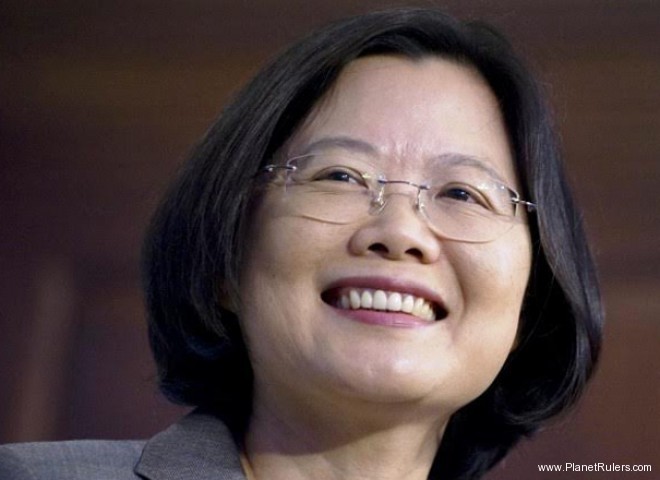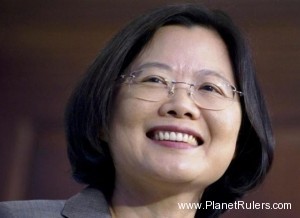



Tsai graduated in law and was subsequently a university professor. From 1993, she was appointed to a series of governmental positions by the then-ruling Kuomintang (KMT) and was one of the chief drafters of the special state-to-state relations doctrine of then President Lee Teng-hui.
After DPP President Chen Shui-bian took office in 2000, Tsai served as Minister of the Mainland Affairs Council throughout Chen’s first term as a non-partisan. She became a DPP member in 2004 and served briefly as a DPP-listed non-constituency member of the Legislative Yuan. From there, she was appointed Vice Premier under Premier Su Tseng-chang until the cabinet’s mass resignation in 2007. She was elected and assumed DPP chairpersonship in 2008, following her party’s defeat in the 2008 presidential election. She resigned as chairperson after losing her 2012 presidential election bid.
Tsai ran for New Taipei City mayorship in the November 2010 municipal elections but was defeated by another former vice premier, Eric Chu (KMT). In April 2011, Tsai became the first female presidential candidate of a major party in the history of the Republic of China after defeating her former superior, Su Tseng-chang, in the DPP’s primary by a slight margin. She was defeated by incumbent Kuomintang candidate Ma Ying-jeou in the 5th direct presidential election in 2012, but was elected by a landslide four years later in the 6th direct presidential election in 2016.
Tsai’s paternal grandfather, of Hakka descent, came from a prominent family in Fenggang, Fangshan, Pingtung, while her grandmother, from Shizi, Pingtung, was of aboriginal Paiwan descent.Tsai’s father, Tsai Jie-sheng (蔡潔生) owned a car repair business. Tsai’s mother, is Chang Jin-feng (張金鳳). Tsai is unmarried and has no children.
According to the traditional Chinese naming practice, Tsai’s name would have been 蔡瀛文, since her generation name is 瀛 (yíng), not 英 (yīng). However, her father believed the former to have too many strokes, so she was instead named 英文, which can also mean “written English”.
Tsai has shown her support for LGBT rights and endorsed same-sex marriage. On August 21, 2015, which is the Qixi Festival (comparable to Valentine’s Day), she released a campaign video in which three same-sex couples actors appeared. On 31 October 2015, when the biggest gay pride parade in Asia was held in Taipei, Tsai expressed her support for same-sex marriage. She posted a 15-second video on her Facebook page saying “I am Tsai Ing-wen, and I support marriage equality” and “Let everyone be able to freely love and pursue happiness”.
Source: https://en.wikipedia.org/wiki/Tsai_Ing-wen
Family
Even though Ma was born in Hong Kong on July 13, 1950, he and his family permanently moved to Taiwan a year later, and have since been living on the island for nearly 60 years. In a family of five children, Ma Ying-jeou is the only male sibling. Ma’s father, Ma Ho-ling, was originally from Hengshan County in Hunan Province on the mainland. From his early years, the elder Ma was already deeply involved in patriotic activities: joining the Youth Army and fighting in the Second Sino-Japanese War. Throughout his lifetime, Ma Ho-ling had dedicated himself to his government and country; he had served in various positions and capacities in the KMT Party and government since winning the war against Japan in 1945 until his death at the age of 85 in 2005. Ma Ying-jeou’s mother, Chin Hou-hsiu, having equally devoted her life to the government, is now a retired civil servant. In 1977, Ma Ying-jeou married Chow Mei-ching. They have two daughters: Ma Wei-chung and Ma Yuan-chung. The smallest addition to their family is an adopted stray dog affectionately called Ma Hsiao-jeou (Little Ma).
Education
Ma Ying-jeou graduated from Taiwan’s foremost academic institution, National Taiwan University, in 1972 receiving a bachelor’s degree from the College of Law. After earning a Master of Laws (LL.M.) degree from New York University in 1976, Ma received a Doctor of Juridical Science (S.J.D.) degree from Harvard Law School in 1981, specializing in law of the sea and international economic law.
Political Career
Upon returning to the Republic of China (Taiwan) in 1981 Ma became the deputy director of the First Bureau of the Presidential Office. In this post, he served as President Chiang Ching-Kuo’s English interpreter and secretary. He was concurrently deputy secretary-general of the KMT’s Central Committee. In 1986, he was assigned by President Chiang the heavy task of researching into the possibility of lifting martial law, relaxing cross-Strait exchange such as permitting residents in Taiwan to visit their mainland relatives, and reforming the parliament.
On October 7, 1986, President Chiang granted an interview with The Washington Post, in which the interviewer was Katherine Graham. During the interview Chiang announced that Taiwan would be lifting martial rule and the ban on forming new political parties. This event marked a momentous turning point in Taiwan’s democratic development. Serving as the president’s English secretary, Ma Ying-jeou was witness to this historic milestone in Chinese civilization.
In 1988, Ma Ying-jeou was appointed Chairman of the Research, Development, and Evaluation Commission of the Executive Yuan. Concurrently, he was also assigned to form a Mainland Affairs Council Taskforce and subsequently became the body’s executive secretary. Three years later, Ma was appointed to the newly established Mainland Affairs Council becoming its first-ever vice chairperson while concurrently serving as a KMT representative at-large in the Second National Assembly.
In 1993, Ma Ying-jeou was appointed the Minister of Justice, in which he launched an aggressive campaign to fight against corruption, drugs, investigated into allegations of vote-buying, cracked down on organized crime and reformed the prison system. Ma’s dedication gained him the respect of his peers and that of society, becoming popularly viewed as a champion for justice. In 1996, Ma was appointed Minister without Portfolio. However, no longer in charge of fighting crime, the following year Ma nevertheless resigned to take responsibility for a series of heinous crimes, notably the kidnap and brutal murder of Pai Hsiao-yan, the daughter of a famous Taiwanese entertainer. He later returned to teach law at the College of Law, National Chengchi University.
Taipei Mayor and KMT Chairman
In 1998, Ma Ying-jeou joined the hotly contested race for Taipei Mayor. This was the first time Ma would run for an elected position and face the scrutiny of public opinion. Campaigning on a platform built on technocratic expertise and a fresh outlook, Ma won the election by 51.13 percent, or 760,000 ballots. Four years later he secured a second term in office, winning 870,000 ballots, or 64.11 percent of the votes. During his eight year tenure as Taipei Mayor, Ma succeeded in transforming Taipei into a world-class cosmopolitan city. Many domestic and international polls have frequently ranked Taipei as among the top quality cities in the region.
In 2005, Ma Ying-jeou ran for the KMT chairmanship. He put forth a roadmap to reform the party’s social and organizational structures and revitalize its image. Ma’s message for change attracted the strong support of young and swing voters, in the end securing him a landslide victory of 73% of the votes.
Special Allowance Fund
On February 13, 2007, Ma was indicted on corruption charges in connection to a special allowance fund that was under his discretionary use during his tenure as Taipei mayor. In response to these charges Ma immediately issued a statement entitled, “Turning Grief and Indignation into Strength,” in which he tendered his resignation as KMT Party chairman and officially announced that he will join the presidential race in 2008.
In the days following this event media polls showed that over 70 percents of respondents believed in Ma’s innocence. In August and December of 2007, both the Taipei District Court and Taiwan High Courts ruled that Ma was innocent of all charges. This decision was subsequently upheld by the Supreme Court on April 24, 2008, marking a definitive victory for Ma Ying-jeou.
Presidential Election Campaign
Upon announcing his presidential candidacy Ma campaigned tirelessly to reach the people; he launched a tour of the entire island trekking on bike to countless towns and villages and living among the people in what the media coined Ma’s “Long Stay.” His sincerity, positive campaigning style and technocratic expertise and experience won him the support of Taiwan’s grassroots. On March 22, 2008, Ma Ying-jeou became the duly elected president of the Republic of China (Taiwan).
Presidency
On May 20, 2008, Ma Ying-jeou was inaugurated as the 12th-term president of the Republic of China. In his inaugural speech entitled, “Taiwan’s Renaissance,” Ma pledges to restore the political ethics of government, bolster the independence of civil society and build an economically viable environment based on sustainability, entrepreneurship and innovation. In addition, creating an open and just society has become the cornerstone of the new Ma administration, where those underprivileged and destitute will receive equal opportunities in society. Finally, Ma Ying-jeou fully intends to honor and execute the articles inscribed in the ROC constitution to their utmost extent possible.
On foreign policy Ma Ying-jeou is committed to deepening Taiwan’s global political and economic integration, as well as strengthening regional cooperation and bilateral ties with neighboring countries, in which he envisions to transform Taiwan into a responsible stakeholder in East Asia. Regarding cross-Strait relations, Ma Ying-jeou has been promoting the policy of “no unification, no independence, and no use of force.” In particular, he advocates the maintenance of the status quo under the framework of the ROC constitution and the resumption of mainland negotiations based on the “92 Consensus.” Ma calls for Taiwan and the mainland to reconcile their differences in cross-Strait relations and in the international community so that both sides can pursue win-win strategies that will contribute to the peaceful development of the region.
Ma Ying-jeou also extends his sincere condolences to the family members of those victims in the Sichuan earthquake and full heartedly wishes for the speedy recovery of the people and area. He hopes that the people of mainland China can experience the same freedoms of democracy and equality as enjoyed on this side of the Strait.
Ma Ying-jeou intends to uphold those ideals that best embody the essence of Taiwan’s spirit¡Xbenevolence, righteousness, diligence, honesty, generosity and industriousness. The new Ma administration envisions creating a government where the economic and political prosperity of the island and the livelihoods of the people come first and foremost.
Source: http://www.president.gov.tw/en/
Rishi Sunak, Prime Minister of the United Kingdom (since Oct 25, 2022) Rishi Sunak (born…
Giorgia Meloni, Prime Minister of Italy (since Oct 22, 2022) Giorgia Meloni (born 15 January…
Mahamat Déby, President of Chad (since Oct 10, 2022) Mahamat Idriss Déby Itno (born 1…
João Lourenço, President of Angola (sworn in on Sept 26, 2017) Sworn in for his…
William Ruto, President of Kenya (elected on Aug 9, 2022 with 50.5% of the vote)…
Gustavo Petro, President of Colombia (since Aug 7, 2022) Gustavo Francisco Petro Urrego ODB ODSC…
This website uses cookies.